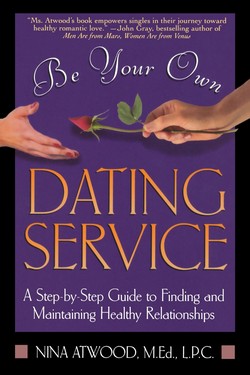Dumpers and Dumpees: Part One
By Nina Atwood
 In every breakup there are two roles: the Dumper and the Dumpee. Put it another way, the person who actually says “I’m outta here” and the person who is left behind. Sometimes we try to save face by agreeing that yes, it’s over, when the other person says they’re leaving. But almost always there is one person who is the first to throw in the towel emotionally. That person usually faces one set of emotions while the other person usually faces a different set of emotions.
In every breakup there are two roles: the Dumper and the Dumpee. Put it another way, the person who actually says “I’m outta here” and the person who is left behind. Sometimes we try to save face by agreeing that yes, it’s over, when the other person says they’re leaving. But almost always there is one person who is the first to throw in the towel emotionally. That person usually faces one set of emotions while the other person usually faces a different set of emotions.
If you threw in the towel first, you are more likely to experience guilt. Dumpers often spend weeks or months agonizing over the decision, weighing the good and the bad in the relationship. Sometimes Dumpers act spontaneously, as in the last-straw syndrome. In that scenario, a random negative act on the part of the other person tips the scales over to “that’s it, I’ve had enough, and I’m leaving.” Almost anything will do so the Dumper can justify leaving.
What Dumpers usually fail to do is communicate clearly what they need, not just once but many times, giving the Dumpee a chance to right the wrongs before deciding to leave. Dumpers usually convey some level of dissatisfaction but without clearly stating that they are considering breaking up. Thus, Dumpees don’t get the seriousness of the issues and are often shocked when the breakup happens, saying they didn’t see it coming. Dumpees often feel blind-sided by their mates.
Why do Dumpers fail to fully communicate? Often it’s a case of not really wanting the relationship, not feeling in love, or feeling that something vital is missing, yet not having the courage to express those feelings. Instead, the Dumper tends to catalog the Dumpee’s negative attitudes and behaviors over time, gradually building justification for a breakup. The end game is the tipping-point last-straw incident.
The guilt is usually because of a deep-down awareness that you didn’t treat the other person fairly (via open honest communication with a desire to work through issues) or an awareness that you settled from the beginning – again cheating the other person out of a good relationship. Sometimes Dumpers feel guilty because of an inappropriate sense of responsibility for the Dumpee’s grief, not realizing that when you don’t really love someone, you are giving them a gift by moving on.
If you are the person left behind, you are more likely to experience a sense of abandonment, usually followed by resentment. As the Dumpee, you feel cheated out of the experience of a real relationship with a solid commitment.
Whether you are the Dumper or the Dumpee, you have emotional baggage to resolve before you can powerfully move on. See Dumpers and Dumpees: Part Two for tips on how to powerfully resolve your past relationships.
Entry Filed under: Advice for Men,Advice for Women,Breaking Up,Dating,Divorce,Relationships






4 Comments
1. Diane | December 8th, 2007 at 8:26 pm
I really do not think it is that simple. I am about to leave my marriage and while my husband definitely feels those things as the dumpee in your blog, I feel it is different when the dumpee has been abusive and has been given every opportunity to change his ways. I had felt divorce was necessary 8 years ago and let myself be convinced things would get better, things would be different, but it has only gotten worse. I did make the decision to be the dumper because my husband will never agree with me that the marriage should end. We are at opposing sides on every issue and the anger and negativity is very severe. I just cannot take it anymore and even though i have tried to explain this to him, he still doesn’t get it. We have been to counseling to a speak to our priest and he is either angry and threatening or is calm and acting like i am overreacting, am completely wrong or making things up. His reality is not mine. I do not know if he will face what is coming until the divorce papers are in his lap. I do not think it is in his best interest for us to be married. He may not see it, but I cannot be married to him, do not love him, and cannot model a dysfunctional relationship for our children. I do not think it is fair to him to continue this way.
2. Gaia | April 2nd, 2008 at 2:36 pm
There is a wonderful book by Thomas Moore called Soul Mates and there is a special chapter for Endings. After the two important break-ups in my life I found his words so wise and up lifting!
Brief quote here “The soul in a relationship is not only contained in each individual, it is also contained in the relationship itself. Blaming the other for the end of the relationship overlooks the soulfulness that has been crafted out of the orginal impulse of love. (…) The relationship itself usually signals its limitations, as the sign of old age signals death.”
If we can trust the mystery that brought the relationship together, apart from understanding our mistakes so we do not repeat them again, we should be able to trust the mystery when the relationship is over.
3. Jackie | May 22nd, 2008 at 10:03 am
Nina,
This is exactly what happened in my break-up. Boyfriend was the dumper and I was the dumpee. There was a lack of communication on his part which I’ve always tried to point out to him, he broke it off on something so small, and I definitely did not see it coming. Ouch! I’m tending to my wounds now.
Thank you so much. I’ve had the same thoughts about this but you made it so clear for me. I actually feel better now.
4. Joe | September 1st, 2008 at 9:17 pm
Wow. This is exactly what happened with me. I was a jerk and scumbagged my ex-girlfriend by dumping her, asking for her back, then dumping her again a month later. I am a jerk, but I should have confronted her about our problems and then ended the relationship before it could hurt her more. This would have spared her a lot of tears. She is an incredible human being and she will thrive without me. I feel evil.